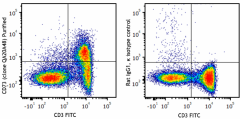- Clone
- QA20A48 (See other available formats)
- Regulatory Status
- RUO
- Isotype
- Rat IgG1, κ
- Ave. Rating
- Submit a Review
- Product Citations
- 1 publications

CD73 is a 70 kD glycophosphatidylinositol (GPI)-linked 5'-nucleotidase, which is also known as ecto-5'-nucleotidase. It converts adenosine monophosphate (AMP) to adenosine. CD73 is expressed on subsets of T and B cells, mesenchymal stem cells, follicular dendritic cells, endothelial cells, and epithelial cells. It has been reported that CD73 costimulates T cell activation, and mediates adhesion of lymphocytes to follicular dendritic cells and endothelial cells.
Product DetailsProduct Details
- Verified Reactivity
- Mouse
- Antibody Type
- Recombinant
- Host Species
- Rat
- Formulation
- Phosphate-buffered solution, pH 7.2, containing 0.09% sodium azide
- Preparation
- The antibody was purified by affinity chromatography.
- Concentration
- 0.5 mg/mL
- Storage & Handling
- The antibody solution should be stored undiluted between 2°C and 8°C.
- Application
-
FC - Quality tested
- Recommended Usage
-
Each lot of this antibody is quality control tested by immunofluorescent staining with flow cytometric analysis. For flow cytometric staining, the suggested use of this reagent is ≤ 0.125 µg per million cells in 100 µL volume. It is recommended that the reagent be titrated for optimal performance for each application.
- Product Citations
-
- RRID
-
AB_2904273 (BioLegend Cat. No. 101702)
Antigen Details
- Structure
- 70 kD GPI-anchored surface protein
- Distribution
-
Positive on most CD11b+ myeloid cells in bone marrow, but not on CD11b+ peripheral cells; a large proportion of CD4+ and CD8+ splenic T cells express CD73
- Function
- A nucleotidase catalyzing the dephosphorylation of extracellular nucleoside 5' monophosphates
- Ligand/Receptor
- Nucleoside 5' monophosphate
- Cell Type
- B cells, Mesenchymal Stem Cells, Tregs
- Biology Area
- Costimulatory Molecules, Immunology, Stem Cells
- Molecular Family
- CD Molecules
- Antigen References
-
- Yamashita Y, et al. 1998. Eur. J. Immunol. 28:2981.
- Resta R, et al. 1998. Immunol. Rev. 161:95.
- Gene ID
- 23959 View all products for this Gene ID
- UniProt
- View information about CD73 on UniProt.org
Related FAQs
Other Formats
View All CD73 Reagents Request Custom Conjugation| Description | Clone | Applications |
|---|---|---|
| Purified anti-mouse CD73 Recombinant Antibody | QA20A48 | FC |
| PE anti-mouse CD73 Recombinant Antibody | QA20A48 | FC |
Compare Data Across All Formats
This data display is provided for general comparisons between formats.
Your actual data may vary due to variations in samples, target cells, instruments and their settings, staining conditions, and other factors.
If you need assistance with selecting the best format contact our expert technical support team.
-
Purified anti-mouse CD73 Recombinant Antibody

C57BL/6 mouse splenocytes were stained with anti-mouse CD3 F... -
PE anti-mouse CD73 Recombinant Antibody

C57BL/6 mouse splenocytes were stained with anti-mouse CD3 F...














Follow Us